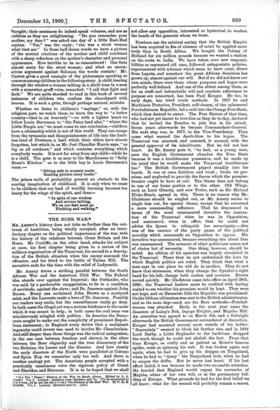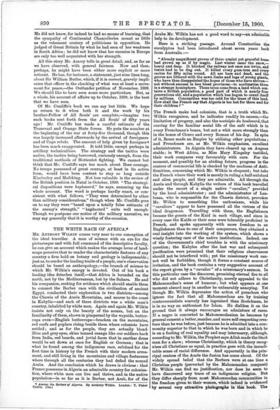THE BOER WAR.*
Ma. AMERY'S history does not take us further than the out- break of hostilities, being wholly occupied, after an intro. ductory chapter on the political importance of the war, with the history of the relations between Great Britain and the Boers. Mr. Cunliffe, on the other hand, attacks his subject at once, his first chapter being given to a review of the military organisation of the Transvaal, his second to a descrip- tion of the British situation when the enemy assumed the offensive, and his third to the battle of Talana Hill. The narrative ends for the time with the relief of Ladysmith.
Mr. Amery draws a striking parallel between the South African War and the American Civil War. The Federal idea stands over against the Imperial; the Outlander, who was said, by a pardonable exaggeration, to be in a condition of servitude, against the slave ; and Dr. Jameson against John Brown. Every one acclaimed John Brown as a martyred saint, and the Laureate made a hero of Dr. Jameson. Possibly our readers may smile, but the resemblances really go deep. In both cases the illegal act was a serious hindrance to the cause which it was meant to help ; in both cases the real issue was mischievously mingled with politics. In America the Demo- crats sought to make out the complicity of prominent Repub- lican statesmen ; in England every device that a malignant ingenuity could invent was used to involve Mr. Chamberlain. And still deeper than these things was the radical antagonism, in the one case between freedom and slavery, in the other between the Boer oligarchy and the trim democracy of the two Britains, the Lesser and the Greater. And how closely the early disasters of the North were paralleled at Colenso and Spion Kop we remember only too well. And there is another analogy yet. The American people accepted with a practically unanimous voice the rigorous policy of Grant and Sheridan and Sherman. It is to be hoped that we shall
• (L) TheHistory of the War in South Africa. gdIted by L. S. Amery. Vol. L London : Sampson Low, Marston, and Co. [To be completed in 6 or 6 vols., £3 Es. net the Set.)-(2.) The History of the Boer War. By F. H.E. Conllffe. VoL 1. London : Methuen and Co. [15s.]
not allow any opposition, interested or hysterical, to weaken the hands of the generals whom we trust.
Nowhere can the satirical saying that the British Empire has been acquired in fits of absence of mind be applied more truly than in South Africa. We bought the Colony of Holland for six million pounds because we wanted a station on the route to India. We have taken over new responsi. bilities or renounced old ones, followed antagonistic policies, experimented with schemes which seem to have come direct from Laputa, and somehow the great African dominion has grown up, almost against our will. But if we did not know our own minds, there were those whose purposes and hopes were perfectly well defined. And one of the ablest among them, as far as craft and indomitable will and resolute adherence to purpose are concerned, has been Paul Kruger. He too, in early days, has tried crude methods. In 1857 he and Marthinus Pretorins, President, self-chosen, of the ephemeral Potchefstroom Republic, led a raid into the Orange Free State, which they desired to annex. The Free Staters of that time, who had not yet learnt to love him as they do to-day, declared that he invited the Basutos to join him in his attack. Seven years afterwards he become Commandant-General. His next step was, in 1877, to the Vice-Presidency. Then came what seemed the death-blow to his hopes. The Transvaal was annexed, and annexed, it seemed, with the general approval of its inhabitants. But he did not lose heart. As Mr. Amery puts it, " he had, as a young man, seen the English Government abandon the Free State because it was a troublesome possession, and he made up his mind that he would make the Transvaal troublesome too." The British Government played steadily into his hands. It was at once faithless and weak ; broke its pro- mises, and neglected to provide the forces which the promise. breaker ought to have at call. The blame does not belong to one of our home parties or to the other. Old Whigs, such as Lord Glenelg, and new Tories, such as Sir Michael Hicks-Beach, agreed in this. There is no reason why Mr. Gladstone should be singled out, as Mr. Amery seems to single him out, for special blame, except that he exercised a more commanding influence. That he denounced in terms of the most unmeasured invective the annexa- tion of the Transvaal when he was in Opposition, and announced, when in office, that he could not advise the Queen to relinquish her sovereignty,—this was of the essence of the party game, of the political morality which commands an Opposition to oppose. His invective was unmeasured, because everything else about him was unmeasured. The measure of other politicians comes not of choice but of necessity. One thing, however, should be noted. An edition of his speeches was largely circulated in the Transvaal. There they do not understand the laws by which English politics are ruled. They think that what a man says in one place he will do in another. They do not know that statesmen, when they change the Speaker's right hand for his left, change both =dam and animum. Events moved quickly. Mr. Gladstone came into office on April 28th, 1880 ; the Transvaal leaders must be credited with having waited to see whether his promises would be kept. They were not kept, and on December 15th the Republic was proclaimed. Onthe 16th an ultimatum was sent to the British administrator, and on the same day—such are the Boer methods—Potchef- stroom was attacked. Early in the next year came the disasters of Laing's Nek, Ingogo Heights, and Majuba An armistice was agreed to on March 6th, and a fortnight afterwards the British Government surrendered at discretion. Kruger had mounted several more rounds of his ladder. ' Suzerainty" seemed to block his further rise, and in 1884 Lord Derby, a Little Englander to the backbone, dropped the word, though he could not abolish the fact. From that time Kruger, as crafty and as patient as Bruce's famous spider, went on spinning his web. It was broken again and again, when he had to give up his designs on Tongaland, when he had to " damp " the Banyailand trek, when he had to reopen the drifts. But he never lost heart. If his last effort failed, it was because he made two excusable mistakes. He fancied that England would repeat the surrender of Majuba, either of her own will, or at the peremptory bid- ding of Europe. What grounds he had for the first belief we all know ; what for the second will probably remain a secret. He did not know, for indeed he had no means of learning, that the sympathy of Continental Chancelleries meant as little as the vehement oratory of politicians in opposition. He judged of Great Britain by what he had seen of her weakness in South Africa; he did not know that her enemies in Europe are only too well acquainted with her strength.
All this story Mr. Amery tells in great detail, and, as far as we have observed, with general fairness. Now and then, perhaps, he might have been either more explicit or more reticent. He has, for instance, a statement, just nine lines long, about Sir William Butler, which, if it is correct, gravely impli- cates that officer in the checking of what was at least a move- ment for peace,—the Outlander petition of November, 1898. We should like to have seen some more particulars. But, as a whole, his account of affairs up to October, 1899, is the best that we have seen.
Of Mr. Cunliffe's book we can say but little. We hope to return to it when both it and the work by his brother-Fellow of All Souls' are complete,—imagine two such books sent forth from the All Souls' of fifty years ago Mr. Cunliffe has made a careful estimate of the Transvaal and Orange State forces. He puts the number at the beginning of the war at forty-five thousand, though this was largely increased afterwards by the arrival of foreigners and of Cape rebels. The amount of help given by foreigners has been much exaggerated. It told little, except perhaps in artillery technicalities. The strategy and the tactics were native, the tactics being borrowed, curiously enough, from the traditional methods of Hottentot fighting. We cannot but think that Mr. Cunliffe says too much about Boer courage. No troops possessed of great courage, at least in its active form, would have been content to stay so long outside Kimberley and Mafeking. Not less valuable is the review of the British position in Natal in October, 1899. " The strategi- cal dispositions were haphazard," he says, summing up the whole account. The word is perhaps hardly exact, or con- sistent with what follows, " They were determined by other than military considerations," though when Mr. Cnnliffe goes on to say they were " based upon a totally false estimate of the enemy's strength," " haphazard " suits well enough. Though we postpone our notice of the military narrative, we may say generally that it is worthy of the occasion.















































 Previous page
Previous page